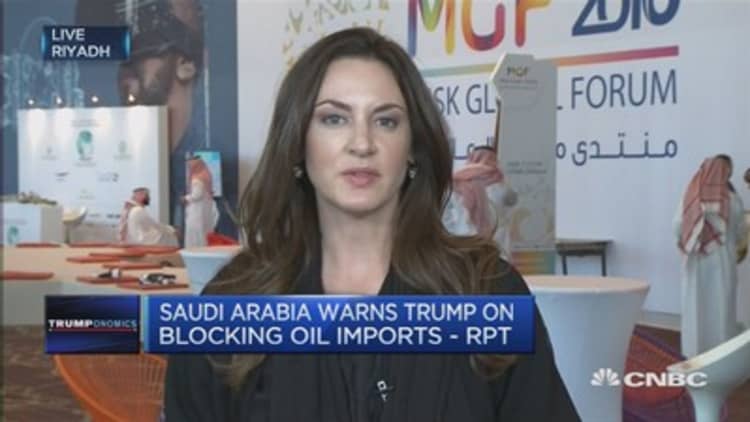
Saudi Arabia has warned Donald Trump that the incoming U.S. president will risk the health of his country's economy if he acts on his election promises to block oil imports.
In a sign of the difficulties Mr Trump faces over his campaign pledges to create "complete American energy independence" from "our foes and the oil cartels", Saudi Arabia's energy minister pointedly reminded the president-elect that the U.S. "benefits more than anybody else from global free trade", adding, "energy is the lifeblood of the global economy".
"At his heart President-elect Trump will see the benefits and I think the oil industry will also be advising him accordingly that blocking trade in any product is not healthy," Khalid al-Falih, who is also chairman of Aramco, the state-run oil company, told the Financial Times in Marrakesh, where he is leading Saudi Arabia's delegation in UN climate talks.
Mr Falih, whose kingdom is the world's largest exporter of crude, said that, although the US imported millions of barrels of oil, it had also "benefited hugely" from being able to freely sell "significant amounts" of exported products.
This free trade had underpinned a thriving refining industry and a shale revolution that had been able to "create a lot of jobs and value", he said.
"The U.S. is sort of the flag-bearer for capitalism and free markets," he added.
"The US continues to be a very important part of a global industry that is interconnected, that is dealing with a fungible commodity which is crude oil. So having equalization through free trade is very healthy for oil."
Mr Falih said Saudi Arabia was still waiting to see exactly what Mr Trump does once he takes office in January and some of his campaign rhetoric had amounted to "50,000 feet announcements" that could change.
"It is common that once presidents start governing then a lot more substance comes out," he said, adding that Saudi Arabia believed the new administration should be given time to "digest all the issues", including how it implements the Paris climate deal being discussed in Marrakesh.
More from the FT:
Saudi Arabia will stick to Paris accord climate change pledges
Mohamed Alabbar to launch $1bn ecommerce platform
SaudiArabia set to reveal depth of oil reserves
Mr Trump has vowed to "cancel" the accord that almost 200 nations sealed in December and has called climate change a "hoax" fabricated by China to hurt U.S. industry.
Saudi Arabia has been among a vocal group of countries insisting that the US election outcome will not affect their plans to curb greenhouse gases under the Paris deal, which Mr Falih described as "a watershed agreement" and "a great thing" that needed to be implemented "sooner rather than later".
However, the minister also said Mr Trump had made some "positive" comments about the importance of fossil fuels.
"We need to address climate change, we need to limit the temperature rise globally to the maximum extent but we cannot do it at the expense of keeping people in poverty and stopping their economic development," the Saudi minister said.

While the world's use of fossil fuels would inevitably "decline over time" as renewable energy became cheaper and better, he said oil and gas were going to remain "a significant part of the energy mix" for years.
The Paris agreement allowed all countries to tackle climate change according to their own capabilities, which meant no one was suggesting the U.S. had to be put in "a straitjacket", the minister said.
Reflecting the frustration of many countries in Marrakesh, Mr Falih said the industrial and technological strength of the U.S. meant it would find it easier to abide by the Paris accord than poorer nations.
"If you think of economies like India and China and other energy intensive economies, I think the U.S. has a lot more flexibility to meet Paris with less sacrifices," he said.
"The U.S. already enjoys a competitive advantage in terms of its energy costs and I think, given what is happening in technology and renewables, especially in the US capabilities in that regard, I think the U.S. will find that provided everybody lives by Paris, the U.S. would retain if not improve its global competitive position."
As government leaders arrived in Marrakesh on Tuesday, François Hollande, France's president, led calls for Mr Trump to stick with the Paris accord.
"The U.S., the most powerful economy in the world, the second-largest emitter of greenhouse gases, must respect the commitments that were made," he said. "It's not simply their duty, it's in their interest."
Ban Ki-moon, the UN secretary-general, told reporters that he hoped Mr Trump would change course, given the urgent need to tackle global warming.
"As president of the United States, I'm sure that he will understand this. He will listen and he will evaluate his campaign remarks," he said.




